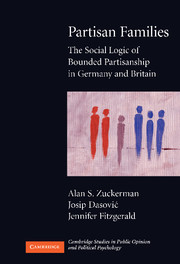Book contents
- Frontmatter
- Contents
- List of Figures and Tables
- Acknowledgments
- Preface: The Theoretical Approach, the Question, and the Data
- 1 The Social Logic of Partisanship: A Theoretical Excursion
- 2 Bounded Partisanship in Germany and Britain
- 3 A Multivariate Analysis of Partisan Support, Preference, and Constancy
- 4 Bounded Partisanship in Intimate Social Units: Husbands, Wives, and Domestic Partners
- 5 Bounded Partisanship in Intimate Social Units: Parents and Children
- 6 Partisan Constancy and Partisan Families: Turnout and Vote Choice in Recent British Elections
- Conclusion: Family Ties, Bounded Partisanship, and Party Politics in Established Democracies
- Appendix
- References
- Index
- Books in the Series
Conclusion: Family Ties, Bounded Partisanship, and Party Politics in Established Democracies
Published online by Cambridge University Press: 05 June 2012
- Frontmatter
- Contents
- List of Figures and Tables
- Acknowledgments
- Preface: The Theoretical Approach, the Question, and the Data
- 1 The Social Logic of Partisanship: A Theoretical Excursion
- 2 Bounded Partisanship in Germany and Britain
- 3 A Multivariate Analysis of Partisan Support, Preference, and Constancy
- 4 Bounded Partisanship in Intimate Social Units: Husbands, Wives, and Domestic Partners
- 5 Bounded Partisanship in Intimate Social Units: Parents and Children
- 6 Partisan Constancy and Partisan Families: Turnout and Vote Choice in Recent British Elections
- Conclusion: Family Ties, Bounded Partisanship, and Party Politics in Established Democracies
- Appendix
- References
- Index
- Books in the Series
Summary
We apply a social logic to mass politics. Enmeshed in intimate social ties, most people live their lives far from the world of politicians and candidates and from the print, radio, television, and internet media. No matter the efforts of the party leaders and political experts, conversations especially among family members – verbal and nonverbal, direct and indirect – refract political messages. When people consider the political parties and when they vote, they bring along the expectations, and they influence the preferences of the members of their personal networks. No matter the isolated circumstances surrounding survey responses and no matter the curtains that surround the voting booths, when people think about the political parties and when they cast ballots, they do not sit or stand by themselves.
Wives/mothers are at the heart of this process. Their partisan preferences consistently affect and are affected by the members of their families. Examining why they are central to the formation of bounded partisans in Germany and Britain directs attention to the social mechanisms that account for social influence, the bases of bounded partisanship. It also suggests the factors and conditions that structure and might transform the party systems in Germany and Britain.
In this chapter, the conclusion to our volume, we also relate the immediate social context of partisanship and electoral behavior – the family – to party politics – competition between and among the political parties.
- Type
- Chapter
- Information
- Partisan FamiliesThe Social Logic of Bounded Partisanship in Germany and Britain, pp. 142 - 160Publisher: Cambridge University PressPrint publication year: 2007



